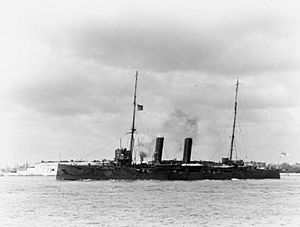HMS Sappho (1891) facts for kids
 |
|
Quick facts for kids History |
|
|---|---|
| Name | HMS Sappho |
| Builder | Samuda Brothers, Cubitt Town, London |
| Laid down | 1890 |
| Launched | 9 May 1891 |
| Commissioned | 1893 |
| Fate | Broken Up 1921 |
| General characteristics | |
| Class and type | Apollo-class cruiser |
| Displacement | 3,600 tons |
| Length | 314 ft (95.7 m) |
| Beam | 43.5 ft (13.3 m) |
| Draught | 17.5 ft (5.3 m) |
| Propulsion | twin screw triple expansion engines |
| Speed | 19.75 knots |
| Complement | 273 to 300 (Officers and Men) |
| Armament |
|
HMS Sappho was a type of warship called an Apollo-class cruiser. She was part of the British Royal Navy and served from 1892 until 1918. She worked in different places, both near Britain and in other parts of the world.
Contents
Life of HMS Sappho
Early Service and the Boer War
In 1900, HMS Sappho was used as a troopship. This meant she carried soldiers during the Second Boer War in South Africa. However, in June 1901, she got stuck in shallow water near Durban. She had to go back to the United Kingdom for repairs.
Another ship, HMS Furious, helped escort her from Las Palmas. Sappho arrived at Sheerness on August 21, 1901. The next day, she went to Chatham for her repairs. On September 18, 1901, she was officially taken out of service at Chatham.
Accidents and Repairs
On June 19, 1909, a foggy night, Sappho was hit by another ship. This happened near Dungeness. The collision made a large hole in Sappho's side, below the water. Water quickly rushed into her engine room.
The cruiser almost sank, but tugboats came to help. They managed to save her and took her to Chatham for repairs. Even with a big hole, about 8 by 6 feet (2.4 by 1.8 meters), the ship was fixed quickly. She was ready to return to duty in just six days. Later that year, on September 30, 1909, Sappho was taken out of service again. This time, it was for a major upgrade at Portsmouth Dockyard.
World War I Duties
When World War I began in August 1914, Sappho joined the Grand Fleet. This was a very large and powerful group of British warships. Other ships like Sappho were changed into minelayers, which are ships that lay underwater mines.
However, Sappho was first sent on patrol missions. In early October 1914, she operated northeast of Shetland. Her job was to help stop German ships from attacking a group of ships carrying soldiers from Canada to England. Later that month, she patrolled north of Orkney.
Sappho continued her patrol duties. She was put in charge of four Armed Boarding Steamers. These were armed ships that could stop and check other merchant ships. Their task was to patrol northwest of the Hebrides. They looked for ships that might be carrying illegal goods to Germany.
The Ostend Raid Attempt
In May 1918, Sappho was supposed to be sunk on purpose in the mouth of Ostend harbour in Belgium. This plan was part of the Second Ostend Raid. The goal was to block the harbour entrance. This would stop German U-boats (submarines) and other attacking ships from leaving Bruges and reaching the North Sea.
But on the day of the attack, while traveling from Dunkirk to Ostend, Sappho had a problem. She suffered serious engine damage from a small boiler explosion. Because of this, she had to leave and could not take part in the raid. Sappho was not used again during the war. She was taken apart for scrap metal in 1921.
Commanding officers
- Captain Cecil Burney - 1900 - September 1901
 | Anna J. Cooper |
 | Mary McLeod Bethune |
 | Lillie Mae Bradford |

